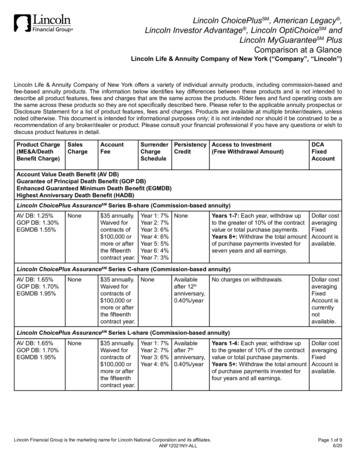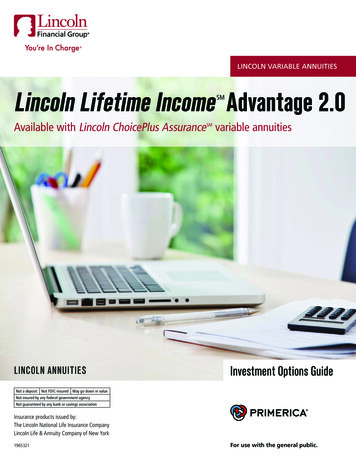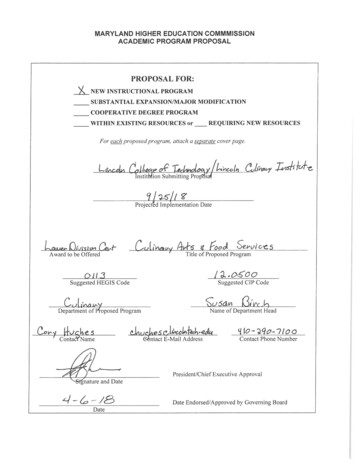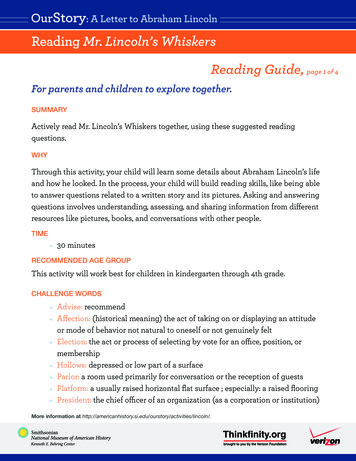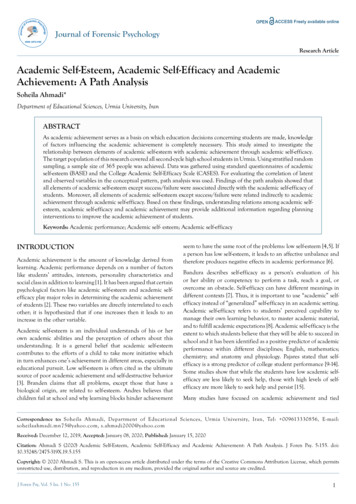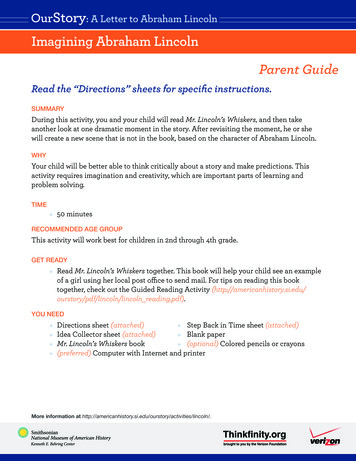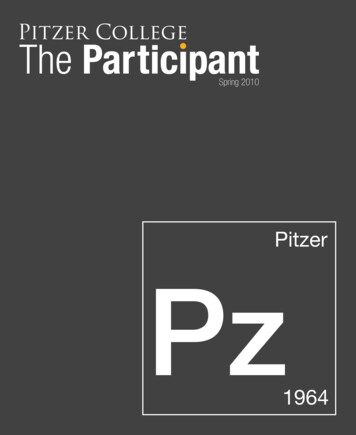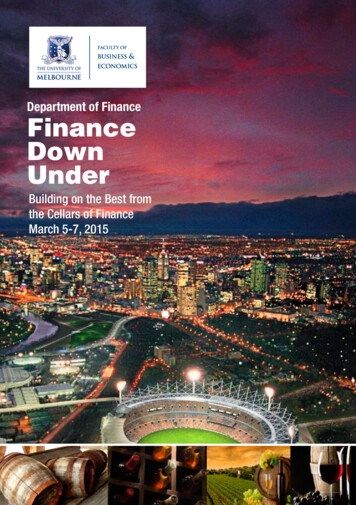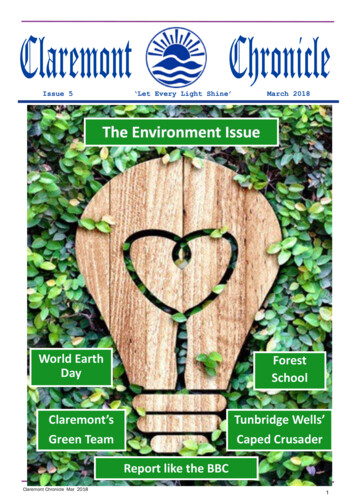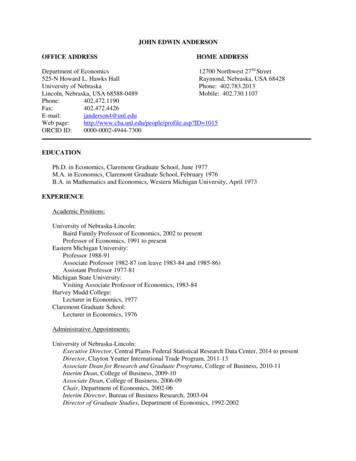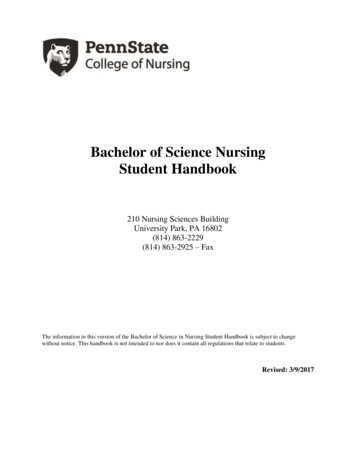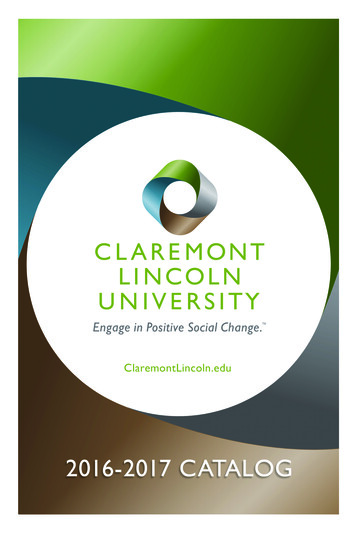
Transcription
1
CLAREMONT LINCOLN UNIVERSITY ACADEMIC CATALOG: 2016-2017 2016 by Claremont Lincoln UniversityBy matriculating, all students agree to abide by the University’s rules and regulations.Claremont Lincoln University reserves the right to change the conditions of admission orthe course of study, revise degree requirements, academic policies and procedures, and/orchange or cancel courses currently scheduled for the program of study without priornotification. Any changes in the conditions for admission or in the program of study willbe communicated to the student in writing.AccreditationClaremont Lincoln University is accredited by the WASC Senior College and UniversityCommission (WSCUC), 985 Atlantic Avenue, Suite 100, Alameda, CA 94501, (510)748-9001.The Commission has confirmed that Claremont Lincoln University has satisfactorilyaddressed the Core Commitments to Student Learning and Success; Quality andImprovement; and Institutional Integrity, Sustainability, and Accountability and is foundto be in substantial compliance with the WSCUC Standards of Accreditation.To obtain a copy of Claremont Lincoln University’s WASC accreditation, please contact:Stephanie Varnon-HughesAccreditation Liaison OfficerSVarnon-Hughes@ClaremontLincoln.edu250 W. First Street, Suite 330 Claremont, CA 91711(909) 667-4400 www.ClaremontLincoln.edu2
TABLE OF CONTENTSHISTORY OF THE UNIVERSITY . 5PURPOSE OF THE UNIVERSITY . 6Mission Statement .6Why Claremont Lincoln—Our Vision . 6The Case for Claremont Lincoln—Our Values. 6Institutional Learning Outcomes . 7OVERVIEW OF ACADEMIC PROGRAMS . 8Master of Arts in Ethical Leadership . 8Master of Arts in Interfaith Action . 8Master of Arts in Social Impact . 8ACADEMIC CALENDAR . 9ADMINISTRATIVE CAMPUS . 11EDUCATIONAL COMMUNITY & OPPORTUNITIES . 11Gathering Weekends . 11The Exchange . 11Commencement . 11CLU Spotlight and Lincoln Awards. 12OFFICE OF STUDENT SERVICES . 13ALUMNI/AE RESOURCES . 13LIBRARY SERVICES . 13TECHNICAL SUPPORT . 14DISABILITY SERVICES . 14ADMISSION . 15Commitment to Inclusion . 15Eligibility Criteria . 15Application Process and Materials . 15Admitted Students . 16Financing Graduate Study . 17TUITION AND FEES . 18ACADEMIC POLICIES AND PROCEDURES . 19REGISTRATION AND ADVISING . 21FINANCIAL AID . 30DEGREE PROGRAM REQUIREMENTS . 36Claremont Core . 363
M.A. IN ETHICAL LEADERSHIP . 38M.A. IN INTERFAITH ACTION . 41M.A. IN SOCIAL IMPACT . 44POLICY STATEMENTS . 47Copyright Policy . 50Equal Employment Opportunity and Affirmative Action Policy. 58Policy on Harassment, including Sexual Harassment . 59Whistleblower Policy . 59Drug-Free Campus Policy (Statement Required by 34 CFR Part 86). 60Student Code of Conduct . 61Student Grievance Policy . 62Services for Students with Disabilities. 62Policy for Research with Human Participation . 63FACULTY . 64ADMINISTRATION AND STAFF . 64BOARD OF DIRECTORS . 674
HISTORY OF THE UNIVERSITYClaremont Lincoln University traces its inception to March 2008 when the Board ofTrustees at Claremont School of Theology voted to embark on an ambitious plan toincubate a new interreligious graduate school. The innovative institution would inviteleaders, scholars and practitioners of the world’s great religious traditions to engage indialogic education to decrease suspicion and foster collaboration in order to moreeffectively work toward positive social change. After over two years of planning,Claremont Lincoln University launched on May 16, 2011 with classes beginning thefollowing fall.In June 2013—only two years after its founding—Claremont Lincoln received Candidacystatus from its regional accrediting body (WASC), which set it on a pathway toindependence from its parent institution. In early 2014, Claremont Lincoln requestedfrom WASC and was granted an independent accreditation process to continue its pathtoward initial accreditation. As part of this process, Claremont Lincoln assumedgovernance of its own educational programs and began charting a new path forward as afree-standing institution.Today, Claremont Lincoln is expanding on its original vision to assemble diverse leaders,scholars and practitioners from across the social sectors to collaborate on our mostpersistent problems through three unique Master of Arts degree programs and variouscertificate offerings. The original interreligious focus is thriving at the University,through the newly designed M.A. in Interfaith Action and certificates in Interfaith Actionand Navigating Interfaith. Another new degree, the M.A. in Social Impact, is designed toattract emerging leaders from the social sector who want to conceive, design andimplement more effective initiatives for social change. The pre-existing M.A. in EthicalLeadership, designed by faculty from the original consortium, continues to educateexperienced professionals in a variety of sectors to be more ethical, effective leaders intheir organizations. Students from each of these degree programs take a sequence of coreclasses, named the Claremont Core , together in order to learn about and from thoseworking in other professional and social sectors. As a result, Claremont Lincolngraduates and certificate completers will be more knowledgeable about and able to workmore effectively with leaders across the social sectors – non-profit, corporate, religious,civil – toward shared understandings for positive social change.Claremont Lincoln’s mission is to educate learners in new ways of understanding. It is anew kind of university that brings people of diverse cultural, religious and ideologicalbackgrounds together so that all can flourish in this interconnected age. This is thetransformative vision for Claremont Lincoln University, which we offer as a spark ofoptimism for the times in which we live: to be a postmodern, post-secular educationalinstitution that seeks common threads amidst human diversity to better understand andmore effectively address our perennial social problems. This is what we mean by“Engage in Positive Social Change.”5
PURPOSE OF THE UNIVERSITYMission StatementClaremont Lincoln is a graduate university that provides innovative educational offeringswith a global imperative. Students will develop capacities for compassionate leadershipacross social sectors. In an interconnected age, these individuals will engage in dialogueand collaboration across cultural, ideological, religious and economic perspectives. Weachieve our mission with three areas of advanced inquiry and practice: ethical leadership,interfaith action, and social impact. Our students will integrate self-knowledge withcritical perspectives and contemporary skills to create sustainable social change.Adopted by the Board of Directors on August 14, 2014)Why Claremont Lincoln—Our VisionAt Claremont Lincoln University, our purpose is to transform ideas and ideals into actionand make the world a better place. We integrate self-knowledge with diverse perspectivesand contemporary skills to create social change for good.Only our proprietary Claremont Core methodology trains and enriches emerging leaderswith the valuable skills of mindfulness, dialogue, collaboration and change-abilities thatare necessary for navigating and transforming today’s complex and often challengingworld.An inclusive, learning community encourages the exploration of diverse beliefs, valuesand traditions which leads to richer thinking and understanding about our spiritual,economic, intellectual, and cultural differences and strengths.When combined, the practical outcome is always: change for good. CLU is a newcatalyst for change.The Case for Claremont Lincoln—Our ValuesFor thousands of years, differences — religious, cultural, ideological and economic —have set neighbor against neighbor and nation against nation, often with violentintractable results. We now live on a planet that is increasingly interconnected bytechnology, global markets and mobility. Opportunities are numerous and far-reaching,but so are the challenges. In such a context, it is imperative to learn to respect andcollaborate with others. From global business to multi-religious workplaces andmulticultural families, successful leadership depends more and more on leaders’ abilitiesto understand, value and communicate with “the other”.Claremont Lincoln University educates students in a comprehensive way to be able towork with others and bring about change. We are a new kind of university:interdisciplinary, multicultural, and multi-religious – a place that educates people ofmany perspectives, side-by-side, so that all can flourish in an interdependent world.Beginning with an understanding of his/her own values, the student learns the knowledge6
and skills to draw out the viewpoints of others through dialogue and then integrates thoseviewpoints through collaboration to chart a path for resolution and positive change.The notion of inclusiveness is even embedded in our organizational development. Ourstructure is intentionally flat and transparent allowing for collaboration and ownership ofprojects and initiatives. Ongoing professional development builds rapport and trustamongst staff and faculty. We operate (work & learn together) according to the followingset of values: Compassion – Follow the Golden Rule: Do unto others as you would havethem do unto you. Integrity – Be consistent and transparent in our values, actions and outcomes. Respect – Value and be mindful of other’s views and traditions. Diligence – Have a commitment to continually improve and the strength tomake a difference. Individual Responsibility – Hold ourselves accountable; deliver on ourpromises. Innovation – Strive to define new ways to make education better. Loyalty – Support and allegiance to CLU Social Impact – Make the world a better place. Service – Provide a quality educational experience to all who encounter CLU.Institutional Learning OutcomesBy the end of a program, a learner will be able to:1.Demonstrate personal, professional, and social agility in serving multipleperspectives through dialogue, collaboration, and decision-making.2.Achieve constructive results in complex and dynamic situations.3.Negotiate agreements for mutual gain and drive conflict resolution.4.Apply key critical thinking skills, evaluate real-world problems, and implementsuccessful solutions.5.Practice the ethics of the Golden Rule as compassionate and transformativeleaders.7
OVERVIEW OF ACADEMIC PROGRAMSClaremont Lincoln University offers the following degree programs. For details, pleaserefer to degree program requirements later in this catalog.Master of Arts in Ethical LeadershipThe M.A. in Ethical Leadership prepares a wide array of professionals across vocationalsectors to integrate personal awareness and professional proficiencies in the areas ofleadership, ethics, and ethical leadership. Guided by the Golden Rule, the mission is toequip individuals to be more effective, ethical leaders in their organization and in society,with the knowledge and consciousness of our interconnected global realities.Master of Arts in Interfaith ActionThe M.A. in Interfaith Action is intended for leaders in faith-based organizations,religious communities, and other public arenas in which religious multiplicity cansimultaneously be a source of conflict and a rich resource for positive change. The degreewill equip such leaders for deeper understanding and more effective engagement forindividual transformation, effective organizational leadership and positive social change.Master of Arts in Social ImpactThe M.A. in Social Impact teaches the capacities needed for mindful leaders—particularly, though not exclusively in the social and civic sectors—to envision,implement, and adapt efforts that generate positive and sustainable impact within and/orbeyond their organizations and communities.8
ACADEMIC CALENDARJuly Term 2016:Independence Day (Offices Closed)Last Day to Receive 100% Refund for Dropped ClassesClasses BeginLast Day to Add a Class1/3 Tuition due for July TermLast Day to Receive 75% RefundLast Day to Receive 25% RefundLast Day to Drop a ClassLast Day to Withdraw from a Class and Receive a W GradeLabor Day (Offices Closed)Final Tuition Payments due for July TermClasses EndAll work from April Term Incompletes DueRegistration Opens for OctoberFinal Grades PostedOctober Term 2016:Gathering Weekend and OrientationJuly 4July 8July 11July 11July 11July 15July 22July 22August 26September 5September 16September 18September 18September 19September 23Last Day to Receive 100% Refund for Dropped ClassesClasses BeginLast Day to Add a Class1/3 Tuition due for October TermLast Day to Receive 75% RefundLast Day to Receive 25% RefundLast Day to Drop a ClassVeteran's Day (Offices Closed)Thanksgiving (Offices Closed)Last Day to Withdraw from a Class and Receive a W GradeFinal Tuition Payments due for October TermClasses EndAll work from July Term Incompletes DueRegistration Opens for JanuaryChristmas Day Observed (Offices Closed)Final Grades PostedSeptember 30 –October 1October 7October 10October 10October 10October 14October 21October 21November 11November 24November 25December 16December 18December 18December 19December 26December 23January Term 2017:New Year's Day Observed (Offices Closed)Last Day to Receive 100% Refund for Dropped ClassesClasses BeginLast Day to Add a ClassJanuary 2January 6January 9January 99
1/3 Tuition due for January TermLast Day to Receive 75% RefundMartin Luther King Day (Offices Closed)Last Day to Receive 25% RefundLast Day to Drop a ClassPresident's Day (Offices Closed)Last Day to Withdraw from a Class and Receive a W GradeFinal Tuition Payments due for January TermClasses EndAll work from October Term Incompletes DueRegistration Opens for AprilFinal Grades PostedJanuary 9January 13January 16January 20January 20February 20February 24March 17March 19March 19March 20March 24April Term 2017:Gathering Weekend, Orientation and CommencementCommencementLast Day to Receive 100% Refund for Dropped ClassesClasses BeginLast Day to Add a Class1/3 Tuition due for April TermLast Day to Receive 75% RefundLast Day to Receive 25% RefundLast Day to Drop a ClassLast Day to Withdraw from a Class and Receive a W GradeFinal Tuition Payments due for April TermClasses EndAll work from January Term Incompletes DueRegistration Opens for JulyFinal Grades PostedMarch 31 – April 2April 2April 7April 10April 10April 10April 14April 21April 21May 26June 16June 18June 18June 19June 2310
ADMINISTRATIVE CAMPUSThe Administrative Campus of Claremont Lincoln University is located 35 miles east ofLos Angeles, in Claremont, California. The city of Claremont is situated at the easternedge of Los Angeles County near the geographic region known as the Inland Empire(comprised of Riverside and San Bernardino Counties), a growing region characterizedby an increasingly ethnically, economically, and religiously diverse population. Knownas “the city of Trees and Ph.Ds.,” the city is home to the Claremont Colleges, aneducational consortium that consists of two graduate and five undergraduate schools.This unique educational consortium attracts scholars, practitioners, and artists fromaround the world; about 5,200 students and 500 faculty members inhabit this town of35,000 people.EDUCATIONAL COMMUNITY & OPPORTUNITIESIt is difficult to imagine a more diverse, more exploratory place than Southern California.Here, hundreds of cultures, religions, and languages exist side by side. SouthernCalifornia is a microcosm of today’s diverse world that is already spreading across NorthAmerica. The Claremont Lincoln educational community brings together partners fromthese diverse backgrounds and traditions for dialogue, collaboration, and the sharedmission to teach, learn, and serve. The Claremont Lincoln community provides anopportunity for practical leadership that reflects the world in which we live.Gathering WeekendsTwice a year at the beginning of the Fall and Spring academic terms, CLU convenes aface-to-face event that brings together students, faculty, key constituencies, and friends ofthe university for an intentional time of networking, socializing, teaching, and learning.The Gathering Weekend typically includes orientation for incoming students, faculty andadministration introductions, The Exchange academic and social workshops, and a socialnetworking mixer. Students from all three programs will have the opportunity to interactwith each other, their instructors and support staff to create a connectedness and personalbond to the university community.The ExchangeAs part of the Gathering Weekend, the University convenes The Exchange, which areface-to-face events that bring together students, and faculty for an intentional time ofteaching, learning, and sharing. Each event includes opportunities for intellectual andpersonal development, and community-wide events that feature speakers, panels,discussion forums, and co-curricular activities. An important part of The Exchange is theinteraction students have with their instructors, to dialogue and collaborate in ideasharing, and to discuss co-curricular activities and action research projects.CommencementOnce a year, prior to the start of the April term, the Spring Gathering Weekend will11
include an annual celebration of all graduates who have completed their degreesthroughout the preceding academic year.Spotlight Gala and Lincoln AwardsThe CLU Spotlight Gala is an end of year fundraising event and fundraiser that highlightsthe accomplishments of our students, graduates, and anyone working for positive socialchange in our communities and beyond.The Lincoln Awards are celebratory acknowledgements of people and/or organizationswho are doing great work in the named areas of the CLU graduate programs. Thus, thereis the Lincoln Award in Social Impact, Ethical Leadership and Interfaith Action. TheLincoln Awards also honors visionaries and activists who have made a profoundlypositive and lasting impact in the communities and who embodies The Golden Rule.12
OFFICE OF STUDENT SERVICESThe Office of Student Services provides support to matriculated students in the followingareas:New Student Orientation: Students learn more about the structure of their academicprogram, university policies such as copyright, use of technology, and student rightsunder FERPA, as well as what to expect in an online learning platform and how tonavigate the student portal, the Learning Management System and access the Library.Academic Advisement: students receive counsel on degree planning, course registration,compliance with university policies, and making the most of resources.Registrar Services: students request transcripts, course withdrawal and transfer,assistance in registration and resolving holds.Disability Services: to aid students in the process of requesting accommodations andliaising with appropriate faculty to put reasonable accommodations into place.Student Billing: available online with additional assistance by Student Servicesregarding payments or invoices.ALUMNI/AE RESOURCESThe first alumni of Claremont Lincoln walked across the stage on May 21, 2013. Theyare the first of many others who will become part of the Claremont Lincoln AlumniAssociation. All of those who have completed 30 units or more are considered membersof the Claremont Lincoln Alumni Association. Graduates may be invited to serve as partof the Alumni Association to advise the administration, plan activities and supportscholarships for current students.The Alumni Relations Office coordinates the resources of the University in order to meetthe ongoing educational and professional needs of alumni. All alumni are invited tocontact the office at any time for assistance or more information.LIBRARY SERVICESLibrary services for Claremont Lincoln are available entirely online through theUniversity’s website utilizing a discovery service called WorldCat Discovery (WCD).Claremont Lincoln students have access to a wide array of electronic books, periodicalsand other resources by searching WCD for quick results of all databases or visitingCLU’s A-Z Database and choosing which database they would like to search. Students13
are also provided with orientation on using the library and have access to referenceservices to assist with research and information literacy.TECHNICAL SUPPORTTechnical Support is available by phone and email to all learners and instructors forissues concerning university email, the student portal, and learning system. Help Deskagents are able to resolve most problems by phone or through remote computer access.When problems require more advanced diagnostics, requests are escalated to engineerswho work Monday through Friday, 6 a.m. to 6 p.m. (PST). Contact information isavailable on the CLU Website.DISABILITY SERVICESIn compliance with Section 504 of the Rehabilitation Act of 1973 and the implementingregulations 34 CFR part 104 (barring discrimination on the basis of disability), and theAmericans With Disabilities Act (ADA) of 1990 and the implementing regulations in 29CFR part 1630 (1992), Claremont Lincoln University is committed to providing studentswith disabilities full access to its programs, events and facilities.The Office of Student Services oversees the coordination of services for students withdisabilities. To benefit from the protection of ADA and Section 504 of the RehabilitationAct, students must self-disclose a disability to the Office of Student Services and requestan accommodation. The University requires the student to provide the Office of StudentServices medical documentation that verifies the existence of the disability, the student’scurrent condition and need for an accommodation. Subsequently, a member of the Officeof Student Services confers directly with the student requesting access for thoroughaccommodation. A student’s disability has no bearing whatsoever on a student’sacceptance or non-acceptance to any of Claremont Lincoln’s degree programs.Potential or current students with a disability seeking an accommodation may contact theOffice of Student Services, which will provide answers to common questions aboutdisability services or the accommodations process and is responsive to all situations.Claremont Lincoln University has an obligation to maintain confidentiality regarding astudent's disability. Any information collected is solely for the student’s benefit. It ismaintained separately from the student's university record and housed within secure fileswith access limited to the Office of Student Services. An accommodated student will beinformed as to what information is being provided to the faculty or staff regarding therequest. Except where permitted by applicable law, disability information will not beshared with non-Claremont Lincoln University employees without the student's expresswritten permission.14
ADMISSIONCommitment to InclusionClaremont Lincoln University admits qualified students of any race, color, national orethnic origin, sex, age, disability, religious tradition, sexual orientation, and genderidentity to all the rights, privileges, programs, and activities generally accorded or madeavailable to students at the University. Admission is dependent upon the strength of theapplicant’s academic record, personal qualifications, professional goals, experience, anda demonstrated commitment to learning in a diverse community. Additionally, ClaremontLincoln welcomes applications from non-immigrant aliens and students outside the U.S.Consistent with its obligations under the law, Claremont Lincoln University prohibitsunlawful discrimination on the basis of race, color, national or ethnic origin, sex, age,disability, religion, sexual orientation, gender identity or expression, or any othercharacteristic protected by applicable law in the administration of the University'sprograms and activities. Claremont Lincoln University also prohibits unlawfulharassment of any kind.Eligibility CriteriaTo be considered for admission to the Master of Arts (M.A.) programs, prospectivestudents must demonstrate the following requirements.1)Bachelor’s degree: Completion of a bachelor’s degree from a regionallyaccredited institution. Graduates of foreign universities must submit anofficial course-by-course international transcript evaluation from one of theapproved credential evaluation service agencies to the Office of Admission.2)Cumulative Grade Point Average: A minimum undergraduate grade pointaverage of 3.00 on a 4.00 scale is preferred.3)English Proficiency: : Graduates of foreign universities at which English isnot the primary language must submit valid, official, internet based (iBT)Test of English as a Foreign Language (TOEFL) scores. Computer basedtest (CBT) scores will only be accepted if applicant lives in a country thatdoes not offer the iBT. Requests for a TOEFL waiver are considered on anindividual basis.Application Process and MaterialsIndividuals apply for admission to a specific degree program by submitting the onlineapplication, paying the nonrefundable application fee, and providing the necessarysupporting documentation. Individuals who satisfy these requirements by theThursday prior to the term start will be considered for admission for the upcomingterm. Applications received or files completed after noon on the Friday immediatelypreceding the term will be considered only if space is available.The application review process is holistic in nature and therefore ensures that eachcomponent of the application is evaluated and used in making the admission decision.Acceptance depends not only on individual qualifications but also on the number of15
available openings in specific degree programs in any given term. Applicants areadmitted to a specific degree program and will be notified in writing after a decisionhas been reached.Complete Applications include:Application: availabl
The M.A. in Interfaith Action is intended for leaders in faith-based organizations, religious communities, and other public arenas in which religious multiplicity can . ACADEMIC CALENDAR July Term 2016: Independence Day (Offices Closed) July 4 Last Day to Receive 100% Re
